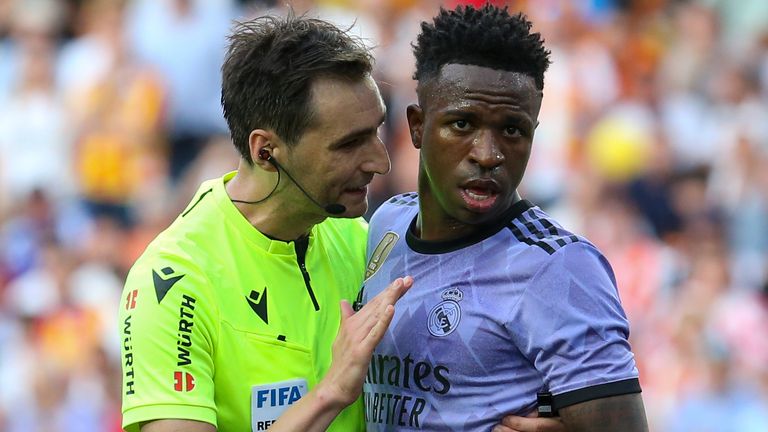United States
Vinícius Júnior Of Real Madrid Speaks Out Against Racism In Spain Following The Recent Abuse Incident In Valencia

Real Madrid striker Vinícius Júnior delivered a powerful speech on racism in Spanish sport. After another round of racist shouts against Valencia, the Brazilian player resorted to social media. At the Mestalla Stadium, fans allegedly called him “mono,” meaning monkey.
Vinícius Júnior voiced dissatisfaction on social media, alleging that racism in La Liga had become commonplace, with competition, federation, and opponents tolerating it. In Brazil, he worried that Spain was becoming a racist nation. Real Madrid agreed with their player and filed a complaint, calling the event a hate crime under Spanish law.
This event highlights racism in Spanish football, particularly the specific abuse of Vinícius Júnior. La Liga reported nine incidents of racist abuse against the player in the prior two seasons. Valencia authorities downplayed the event, claiming the yelling was intended at Vinícius Júnior using the word “tonto,” meaning foolish, instead of the racially disparaging slur “mono.”
Coach Carlo Ancelotti of Real Madrid voiced his dismay at the event, turning the emphasis from the game to stadium racism. In a heated Twitter battle, league CEO Javier Tebas defended Spain’s anti-racism measures and chastised Vinícius Júnior for missing meetings to handle abuse.
International outrage followed the occurrence. President Luiz Inácio Lula da Silva of Brazil supported Vinícius Júnior and condemned racial discrimination in sports stadiums. Kylian Mbappé and Neymar, among others, helped Vinícius Júnior and blasted the Spanish authorities for not addressing racism in sports.
La Liga said it would work with authorities to examine the event and reiterate its commitment to eliminating racism in its stadiums. The event has raised doubts about Spanish football and its regulating authorities’ capacity to combat racism, especially as they bid for the 2030 World Cup.
Spanish soccer federation head Luis Rubiales recognized the issue’s gravity and called for a comprehensive effort to combat racism and prejudice in the sport.
The event highlights the ongoing struggle to eliminate racism from sports and the need to promote a more inclusive and respectful football environment.
Black Players’ Vinícius Júnior Experience With Spanish Football Racism
Spanish football is plagued by racism, with fans regularly abusing black players. Vinícius Júnior of Real Madrid faced racial insults during a match against Valencia, making headlines again. The event exposed racism in Spanish stadia and the challenges faced by black players like Júnior. Authorities have tried to stop such conduct, but the absence of effective deterrents has tarnished the sport’s reputation and hurt affected players’ mental health and performance.
How Authorities Should Address Racism In Spanish Soccer
The recent Vinícius Júnior incident has sparked a reevaluation of Spanish soccer officials’ racial discrimination policies. La Liga has made attempts to eradicate racism, yet similar events recur, calling into doubt its effectiveness. Limited disciplinary steps, such as stadium closures, have failed to discourage abusers, requiring a more comprehensive and strict response to sports racism. The event also highlighted the Spanish Soccer Federation’s involvement in imposing harsher restrictions and developing educational initiatives to promote respect and diversity in stadiums.
Read Also: Black Women Face Higher Maternal Death Rates Due To Racism And Sexism, According To The U.N.
Global Solidarity And Collective Action Against Sports Racism
Vinícius Júnior’s story gained global support from renowned people and sportsmen. The event sparked widespread support, underlining the necessity for sports-wide racism elimination. Players like Kylian Mbappé and Neymar, who experienced racist abuse, offered solidarity. Global leaders like Brazil’s President Luiz Inácio Lula da Silva have stressed the need to eradicate societal racial stereotypes. The event resonates beyond athletics, reminding us of our obligation to promote equality and respect across borders and cultures.
Racism’s Psychological Impact On Spanish Football’s Black Players
The continuous prejudice against black Spanish football players affects their mental health beyond the public uproar. The frequent bombardment of insulting insults and discriminatory conduct destroys their sense of belonging in the sports community and increases alienation and despair. Such encounters may cause tension, worry, and low self-esteem. Although many athletes are resilient, the long-term effects of continuous racial abuse need a comprehensive support structure that includes mental health services and athlete advocacy.
Education And Awareness Crucial To Fighting Racism In Spanish Football
As the uproar against racism in Spanish football rises, so does the need for education and understanding in creating a culture of inclusiveness and respect in sports. To promote diversity, players, spectators, and officials must be equipped to identify and combat racial prejudice. Educational programs, seminars, and diversity training may build conversation, empathy, and a shared commitment to fighting discrimination. Spanish football can create a more inclusive and fair future for all players by embracing comprehensive education techniques.
Need For Structural Reforms And Accountability
Following the Vinícius Júnior incident, proposals for structural changes and more responsibility in Spanish football have gathered steam. The demand for harsher punishments and more vigorous enforcement to discourage and punish discriminators is growing. Advocates have called for reviewing laws and regulations to increase penalties for racism to make sports safer and more inviting. To drive structural change and promote diversity and equality in Spanish football, various perspectives must be included in leadership and decision-making organizations.












You must be logged in to post a comment Login